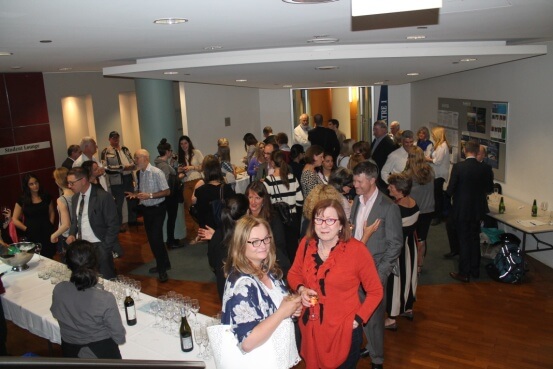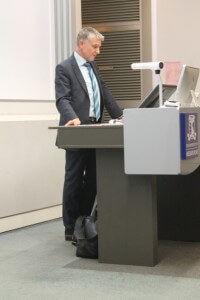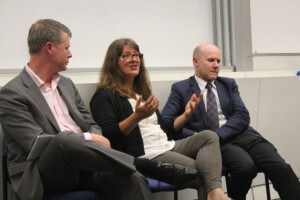Melbourne Melanoma Project (MMP) 2014 Scientific Exchange Meeting – December 11th 2014
The 2014 MMP Scientific Exchange was well supported by all members of the melanoma community. Patients, carers, doctors, health professionals, researchers, pharmaceutical company representatives and Department of Health staff attended the event.

Under the auspices of the Galli Chair for Melanoma & Skin Cancer, at the  University of Melbourne, Professor Grant McArthur, Chief Investigator of MMP, welcomed everyone. He then spoke about the rising incidence of melanoma, as compared to the downward trend of cancer overall, and how MMP intends to help address this. The new iteration of MMP has adjusted its focus to concentrate more on later stage patients and their responses to new treatments. The project will be investing significantly in new genomic and immunology techniques across multi-site research platforms.
University of Melbourne, Professor Grant McArthur, Chief Investigator of MMP, welcomed everyone. He then spoke about the rising incidence of melanoma, as compared to the downward trend of cancer overall, and how MMP intends to help address this. The new iteration of MMP has adjusted its focus to concentrate more on later stage patients and their responses to new treatments. The project will be investing significantly in new genomic and immunology techniques across multi-site research platforms.
One of the new techniques being investigated is the use of a blood sample or a ‘liquid biopsy’ to measure melanoma disease outcomes. Associate Professor Alex Dobrovic explained the technique and the research being conducted at the Olivia Newton-John Cancer Research Institute (ONJCRI). Dr Stephen Wong then showed the audience some preliminary data correlating tumour DNA in blood with tumour burden as shown on PET scans, done at the Peter MacCallum Cancer Centre. Collaboration is a key component of MMP and these investigational liquid biopsies are a direct result of the project’s collaboration with our consumer community, who said that they would prefer a blood test to a tumour biopsy at our 2013 Scientific Exchange meeting.
Dr Julia Lai-Kwon explained her analyses of the all the clinical features of melanoma used to determine if there was a difference between rural and metro members of the Victorian MMP cohort. Although more parameters were examined than those used in interstate studies, no significant differences could be found, excepting for patient access to clinical trials. Dr Lai-Kwon is now going to compare the MMP data with the Victorian Cancer Registry data to ascertain if MMP’s cohort truly reflects that of the state. Survival analyses could not be done at this point as the MMP cohort is still too ‘young’ and does not have enough follow up data yet.
The panel discussion that ensued was facilitated by Professor McArthur. He opened the discussion about rural vs metro access to clinical trials by asking Paul White, a metro melanoma survivor,
“How important is access to clinical trials for melanoma patients?” Mr White used the 216 responses from the consumer group’s 2014 survey to answer. “Access is crucial to all patients. 93% of respondents believed that clinical trials were a valuable means of developing new treatments and 92% said they were a valuable means of improving patient survival/treatment outcomes. 50.5% of patients further indicated they would travel 1-5 hours and 18.4% said they would be prepared to travel more than 5 hours or even interstate to get access to trial treatments.” Mr White said that “people were proud to participate in clinical trials which are seen as very important as they offer hope for both current and future participants.”
 Ms Diane Shepheard, a rural carer who lost her husband to melanoma, reiterated that
Ms Diane Shepheard, a rural carer who lost her husband to melanoma, reiterated that
“a clinical trial was often the only option left and when that appeared to be failing you were searching for the next available trial. Patients will always travel if it means they can have a further six months with their family.”
Dr Andrew Haydon, a medical oncologist,
said “It is still the case that all stage IV patients will relapse but the new treatments available have brought hope, extending lives for up to 10 years at this point. I talk to my patients about the hope that they too will become a long term survivor.”
(It has been reported that some patients have lived up to 10 years more on Ipilimumab and some BRAF-mutant patients have survived 3-4 years longer on targeted therapies). Liquid biopsies could potentially become the tool to recognise resistance and move patients on to a new treatment. None of the audience felt that being part of clinical trial meant that they were a scientific guinea pig. Ms Shepheard said that “patients on clinical trials received better care as they were monitored more closely, as required by the trial protocols”. Dr Haydon advocates for melanoma clinical trials but tells his patients about all of the options available. Clinical Trial recruitment figures will often reflect the degree of enthusiasm a clinician has for a trial. Some trials, such as colorectal ones, are difficult to recruit to as there are many other standard treatment options available. As melanoma drugs are relatively immature it is essential to continue to keep patients engaged with clinical trial work.
The audience wished to know if all melanoma patients will have access to PD-1? PD-1 is not on the PBS. In the past access was only via clinical trials. There are a couple of new access programs in Australia that have been set up by the pharmaceutical companies but conditions apply. Patients need to be Stage IV and have previously failed on Ipilimumab. It should be noted that some patients do not respond to PD-1 either, highlighting the ongoing need for more research into new drugs, combinations of drugs, management of drug toxicity, etc. MMP can assist with the monitoring of patients on clinical trials. Its scientists will be using patient bio-specimens to look for biomarkers to predict which treatments are best for individual patients.
Dr David Gyorki, a melanoma surgeon in the audience, found that he had no trouble getting later stage patients to travel and participate in clinical trials but found that early stage rural patients were particularly reluctant to commit to regularly travelling to the city.
Ms Shepheard said that “trial protocols were not written with rural patients in mind. Couldn’t some of the monitoring be done at rural medical centres?”
Ms Shepheard and her husband rented an apartment in Melbourne to enable her husband to participate in clinical trials whilst she travelled back and forth to look after their four children and property during a very difficult and stressful time. The Victorian Cancer Agency (VCA) has said that they are investigating ways of supporting clinical trials in rural Victoria.
Representatives from the pharmaceutical organisations said that their companies were interested in conducting more clinical trials in Australia. Sites were often chosen because of their facilities, track record, trusted reputation and ability to recruit larger numbers of appropriate patients. Unfortunately many rural hospitals are not registered to conduct Phase 1 clinical trials. Good Clinical Practice for Phase 1 patients insists upon specialist nursing and pharmacology monitoring for at least 24 hours. Often rural centres cannot afford to engage the necessary workforce for small numbers of patients. It is also difficult for regulatory trial monitors to track all aspects of the data collection at satellite hospitals.
Professor Jonathan Cebon, Medical Director of the Olivia Newton-John Cancer Research Institute (ONJCRI), suggested that the limited amount of dollars set aside to help improve access for rural patients should be used to support families like those of Ms Shepheard’s and facilitate better links between metro and rural oncologists. Statewide electronic health records may help rural and metro links in the future. Australia is not keeping up with electronic health systems which include privacy features that are being utilised overseas.
As clinicians would like to know if treatments are failing as soon as possible Professor Grant McArthur asked Dr Stephen Wong “What is the rate limiting step for future liquid biopsies?: Technical development?; Time?; Funding?”
Dr Wong responded that “tumour DNA in blood samples only lasts for 2 hours making processing and storage an unrealistic and expensive practice in busy hospitals. Fortunately other parties have also seen the need for innovation and have developed new blood collection tubes that protect the tumour DNA in blood for up to 14 days at room temperature.”
MMP are looking to use these new but expensive tubes for blood collections at rural recruitment sites to facilitate the liquid biopsy test.
Professor McArthur reiterated that “clinical trials are essential for the development of new technologies that will guide future clinical treatments.”
The meeting closed with a clear message to all members of the melanoma community “all ideas are welcome, including the possibility of a name change to the Victorian Melanoma Project!”
Email: info@melbournemelanomaproject.com
Phone: +61 3 9656 5248
Fax: +61 3 9656 1129
Website: https://melanomaresearchvic.com.au/
Twitter: Melanoma_MMP
Facebook: Melbourne Melanoma Project
